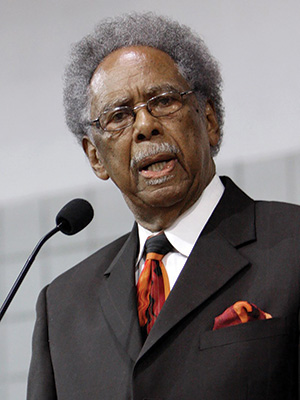Princeton Faith and Action Hosts Distinguished Guest
by Catherine Elvy, Staff Writer God will supply for His beloved servants, even in the midst of forbidding circumstances.
God will supply for His beloved servants, even in the midst of forbidding circumstances.Rev. Lincoln Bingham offered that inspiration when the longtime pastor and grandson of a slave spoke as part of Princeton Faith and Action's commemoration of Black History Month.
The Kentucky minister told students who attended a TruThursday series how both his grandfather and father, a sharecropper, maintained their faith, despite living through some of the darkest chapters of American history.
"They really did put their faith in God, and God really did supply sufficiently," Bingham said during his appearance on February 11 in Guyot Hall. "They kept telling me I would be OK and to put my faith in God. The rewards would come at the appropriate time."
Bingham's grandfather, who eventually owned a small business, reached 100 years old, while his grandmother lived to 96 years old. "They were peaceful and happy," he said.
Remarkably, Bingham once spoke at a racial-reconciliation conference in Dallas, not far from where his grandfather was sold on an auction block. While preaching, he was struck by God's redemption in his family's story. "Here I am proclaiming the Good News of Jesus Christ," said Bingham, highlighting the reversal of his family's narrative to one of liberty.
Indeed, the Bingham family chronology crisscrosses key chapters of the quest for racial equality on the American landscape.
Most notably for Bingham, the Louisville resident made national headlines as a race-relations pioneer in 2009 when his predominantly African-American church, St. Paul Missionary Baptist, merged with the mostly Caucasian church, Shively Heights Baptist. Today, Bingham, who has held numerous positions within statewide Baptist organizations, serves as pastor of St. Paul Baptist Church at Shively Heights in Louisville.
In addition, Bingham said his family's heritage of faith played a role in his decision to accept Christ as his personal savior and to dedicate his life to ministry. "I wanted the same power and confidence in God that my parents and grandparents had," said Bingham.
As such, Bingham received biblical training at Boyce College and Simmons College, and holds three honorary doctorate of divinity degrees.
Despite feeling stigmatized by his backcountry roots, Bingham told students that Christ gave him a new identity. "I realized I was as good as anybody else," he said. "I could achieve the goals I set for my life."
Bingham told Princeton undergraduates that his Heavenly Father is a champion of justice. Exodus captures the dramatic account of how the Almighty answered the cries of Israelites while they were in bondage in Egypt.
"He had a plan and a man," Bingham said. "He is the one that brings deliverance."
As believers confront racial inequalities besetting the Twenty-First Century, they need to recall the Lord's ancient, but still poignant, instructions to "fear not" and "be still."
Bingham, who was active in the Civil Rights Movement, said Christians should be aware of the spiritual components of their efforts and pray for God to open doors and provide opportunities to usher in change.
"Teach people not to surrender to injustices," said Bingham, whose message at Princeton was entitled The Role of the Church during the Civil Rights Movement and Today.
At the core of the Christian message, "every life matters. There should never be any suggestion or acceptance that black lives don't matter," Bingham said. "In our own churches and community, sometimes we treat each other as if lives don't matter."
When confronting overt mistreatment or subtle vestiges of discrimination, believers need to practice measured responses. Still, "it's hard to be mature and always respond appropriately," Bingham said. "Don't try to reciprocate the same type of thing upon the oppressor. Be a Christian and trust God."
Also during February, Princeton students gathered for extensive prayer for the African-American community, and they staged a forum to probe the place of Christianity in the quest for racial justice.
James Fields, a Christian Union ministry fellow, was impressed with how students with Princeton Faith and Action coordinated the Black History Month events and "showed the campus how inclusive the Gospel can be."
Ultimately, the Bible calls believers to "go against racial injustice," Fields said.
Bingham echoed those comments, noting the tentacles of injustice are overcome by "the power of God and the participation of believers."
At 84, Bingham said he simply wants members of younger generations, the flower of their forebears' dreams and struggles, to embrace faith and confidence in God throughout the pursuit of racial equality. "He will deliver us out of injustice," Bingham said. "God will give you protection and deliverance."
And Bingham continues to share the spiritual and cultural lessons he gleaned from his elders. Namely, "when you do the right thing in the right way, it pays off," Bingham said. "God has been good to me."





